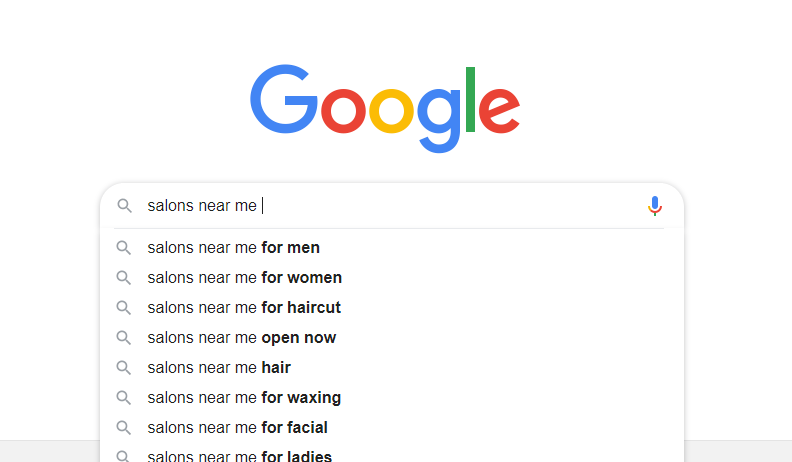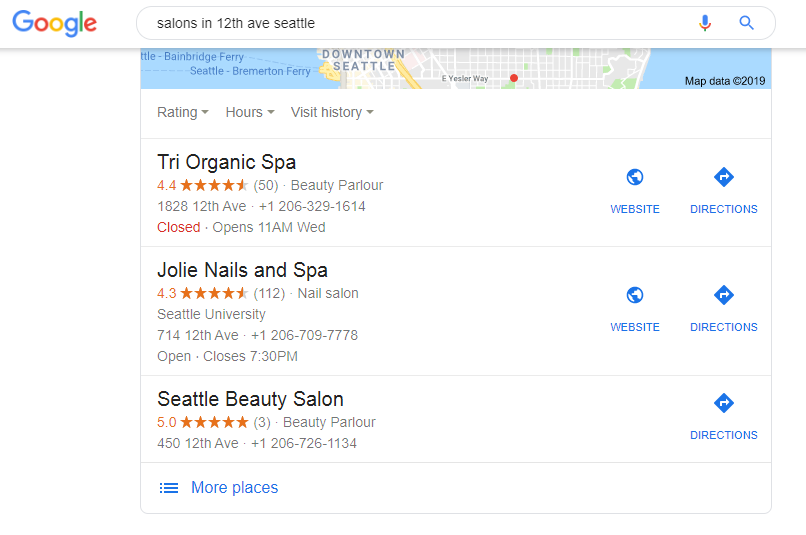If in 2020 you are looking for an SEO strategy that gives your business the required visibility and with it increases the number of customers, then Local Search Optimization is the way to go.
As recorded by Google, 46% of the searches have local intent. These searches include all the practical terms that define it local, such as “near me”:

Basically, local SEO focuses on emphasizing the optimization of local brick-and-mortar businesses that contain certain geo qualifiers – city, zip code, and the obvious “near me” searches that provide services in a certain locality.
95% of smartphone users make use of their device to perform local searches, according to Forbes, out of which 61% have called the business and 59% have visited.
Seeing these percentages, it can be easily calculated that leads from location-based searches are a major aspect of potential customers, and those numbers are expected to grow every year. Since these searches are from people who are looking for specific products and services for a specific location they are expected to have a higher conversion rate.
Now let’s unlock the local SEO elements that will have a powerful impact in the year 2020.
1.Google Local Packs
Local 3-pack is like a map that shows search results according to the user’s query, as well as a three-item list of businesses with their Name, Address, and Phone Number (NAP).

The number of businesses visible on the Local Pack helps the users on the mobile phone to get an estimate of the proximity of the local businesses. Apart from the filters and maps features, the user can see a list of businesses together with the review rates, office hours, NAP, and a call to action.
2. Local Teaser
Local teaser is very similar to the local pack in that the users do not even notice it. The local pack shows the top three results with the company’s NAP, reviews, website, and call to action while the local teaser consists of the company’s short description, with no address or phone number, and no links to the website or directions. Users are given specific data through which they can decide whether to take up the service from the business; they can even filter to sort local results by pricing, rating, and amenities.
As a business owner, the local teaser benefits as the local pack does not include all the information about your business. And this is why Google separated the local pack and local teaser. Google started realizing that its users required more information about the nearby businesses and thus entered the local teaser.
[Case Study] Driving growth in new markets with on-page SEO
3. Schema Markup
Schema Markup helps gain a lot of traction and a competitive edge in SERPs. They help display data that are specific to certain businesses and appear as a single entity across the SERPs. Most of the businesses make use of schema markup to help generate rich snippets for their businesses, be it doctors, small eateries, electronics shops, or something else.
But to generate rich snippets, Google has thrown up a number of guidelines to adhere to. First and foremost, they say that the schema should not be spammy in any way. To avoid this you should always ensure that your markup of the page aligns with the user intent.
Some Formats of Schema Markup –
- Standard Schema Microdata that is included in the HTML is the simplest format.
- JSON-LD is implemented via JavaScript and is the most recommended format.
- RDFa is another type of format that includes XML, HTML4, SVG, and others.
An example of Schema Markup:
<div itemscope itemtype="http://schema.org/SalonService"> <span itemprop="name">Name of the Salon</span> <span itemprop="address">Salon Address</span> <div itemscope itemtype="http://schema.org/PostalAddress"> <span itemprop="addressLocality">City</span>, <span itemprop="addressRegion">State</span> <span itemprop="postalCode">Zip Code</span> </div> <span itemprop="telephone">Phone Number</span> </div>
Before adding code to your website make sure to test it first. The most certain way to do it is by testing it on Google’s Structured Data Testing tool.

Either you can paste the URL or the Code Snippet. We have run the code snippet for the above given code.

This is how you can discover where your schema has errors and fix them, to obtain an accurate set of codes.
4. Ranking for Long Tail keywords
Your users are not always going to search for exact keywords. They might type a long query or a set of phrases to find the right service or product matching their needs. As a business owner you should always keep in mind that your customers are going to ask questions starting with how, when, where, which, etc. To answer these, there are various tools present online to know the general potential questions. Based on these questions, you can create unique web pages that answer the exact queries asked by your customers.
Tip: Use a VPN to find out the correct set of keywords or phrases for your website optimization if you are targeting another country. One of the best VPN is NordVPN, reviewed by the experts as an excellent choice for streaming and browsing! Also, this VPN can be used for Mac, Windows, or any other device available online to make your keywords list impactful and accurate.
Additionally, you can also take the help of Quora to look for more commonly asked questions in your area according to your industry.


5. Online Directories
A decade ago, local businesses had a lot of traditional ways to list their business for PR purposes. These included advertising in local newspapers, print marketing, telemarketing, and running television ads.
Now, in the digital era, there are multiple options where one can list their business to drive traffic and boost revenue.
For this, you can start by choosing the right listing platform for your business type. Online Directories are the most powerful and a free way to advertise your business online.
Recognize which platforms make sense to be listed on. It is not a good idea to list your business on every possible directory just for the sake of putting your name out in the online world. Also, remember to hit the major online directories, such as Google My Business, Yelp, and Facebook, among others.
Things to be listed in your Online Directory:
- Business Name
- Address
- Contact Number
- Website URL
- Categories
- Description
- Present Social Profiles
- Taglines
- Images
- Any other additional media
- Certification
- Associations
- Attributes
Citations and Directories are impactful ways to represent your business as its quality, consistency, and spread affect your local search engine ranking, traffic, visiting customers, and transactions. In light of a listing’s significance, it is important that you list your business accurately.

6. Voice Search SEO
Google, find me the nearest salon.
This is how today’s user makes an online search. They simply ask the search engine to look for the required service or product.
The option to get an answer through voice search has now been ingrained in our routine life. But, how is it helpful for local SEO?
According to Searchengineland, the majority of local searches are carried out through smartphones and 18% of these searches are converted within a day. And that mobile searches have a strong local intent (around 87%).
The main reason your local seo strategy should change is because users are perceiving local searches online. Some points to optimize your business according to voice search search should include –
- Optimizing your content according to the user’s intent
- Form queries into question phrases
- Provide concise answers to questions
- Target long-tail keywords
- Make sure your website is fast, mobile-friendly, and secure
- And ensure your Google My Business profile is completely filled out.
Some more factors that will affect the local businesses search in 2020
- Businesses providing high-quality services or products will automatically rank higher on search engines. As Google reviews and scores are taken into account for search ranking: more good reviews and positive ratings will improve a business’s local ranking.
- Authority of the business will be a critical factor. This will include business popularity, customer engagement, repeat clients, location choice, and customer experience.
- Relevancy of your business, the business listing that you have done on search engines should contain the correct information for a relevant search result.
Local SEO is going to be a big way to monetize your business in the upcoming years. Keep in mind all the above tips to boost your website’s ranking and along with it work on organic SEO tactics if you are targeting a lot of cities or another country.

